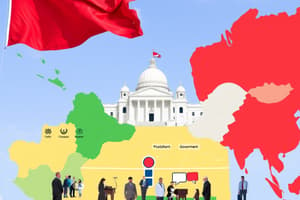Podcast
Questions and Answers
Which core aspect of political science involves analyzing and comparing different political systems across countries?
Which core aspect of political science involves analyzing and comparing different political systems across countries?
- Political Theory
- Public Administration
- International Relations
- Comparative Politics (correct)
A dispute arises between two private companies regarding a breach of contract. Under which type of law would this issue be typically resolved?
A dispute arises between two private companies regarding a breach of contract. Under which type of law would this issue be typically resolved?
- Civil Law (correct)
- Constitutional Law
- Criminal Law
- Administrative Law
Which of the following best describes the focus of public administration within political science?
Which of the following best describes the focus of public administration within political science?
- Analyzing interactions between nations and international bodies.
- Interpreting constitutional principles and legal precedents.
- Implementing government policies and managing public programs. (correct)
- Examining the philosophical foundations of justice and rights.
A new regulation is proposed by a government agency that significantly impacts environmental standards for businesses. Which area of law is most directly relevant to the legal challenges that might arise from this regulation?
A new regulation is proposed by a government agency that significantly impacts environmental standards for businesses. Which area of law is most directly relevant to the legal challenges that might arise from this regulation?
What is emphasized by social justice?
What is emphasized by social justice?
A country ratifies a treaty obligating it to reduce carbon emissions. This scenario falls under which category of law?
A country ratifies a treaty obligating it to reduce carbon emissions. This scenario falls under which category of law?
In a society marked by significant disparities in wealth distribution and access to essential services, which concept would be most directly applicable in addressing these imbalances?
In a society marked by significant disparities in wealth distribution and access to essential services, which concept would be most directly applicable in addressing these imbalances?
Which of the following scenarios illustrates the principle of equality?
Which of the following scenarios illustrates the principle of equality?
Which concept necessitates addressing varying individual circumstances to ensure equitable outcomes?
Which concept necessitates addressing varying individual circumstances to ensure equitable outcomes?
What is the core tenet of human rights?
What is the core tenet of human rights?
Social justice advocates primarily aim to promote which of the following?
Social justice advocates primarily aim to promote which of the following?
Which discipline provides the normative framework for evaluating fairness in political and legal systems?
Which discipline provides the normative framework for evaluating fairness in political and legal systems?
What role does political science play in the context of public policy?
What role does political science play in the context of public policy?
How do legal principles influence public policy?
How do legal principles influence public policy?
Which characteristic is NOT considered a fundamental aspect of human rights?
Which characteristic is NOT considered a fundamental aspect of human rights?
What is the role of political science in the context of human rights?
What is the role of political science in the context of human rights?
What is the primary function of constitutional law?
What is the primary function of constitutional law?
How do social justice considerations influence constitutional law?
How do social justice considerations influence constitutional law?
Which of the following is NOT a component of the criminal justice system?
Which of the following is NOT a component of the criminal justice system?
What role do legal principles play in criminal justice?
What role do legal principles play in criminal justice?
What do civil rights primarily protect individuals from?
What do civil rights primarily protect individuals from?
How do legal frameworks support civil rights?
How do legal frameworks support civil rights?
What is the main goal of social movements?
What is the main goal of social movements?
Flashcards
Political Science
Political Science
Study of politics, political systems, and behavior.
Political Theory
Political Theory
Principles underpinning political life, like justice and democracy.
Comparative Politics
Comparative Politics
Analyzes and compares different political systems across countries.
International Relations
International Relations
Signup and view all the flashcards
Public Administration
Public Administration
Signup and view all the flashcards
Law
Law
Signup and view all the flashcards
Criminal Law
Criminal Law
Signup and view all the flashcards
Social Justice
Social Justice
Signup and view all the flashcards
Equity
Equity
Signup and view all the flashcards
Human Rights
Human Rights
Signup and view all the flashcards
Social Justice Advocates
Social Justice Advocates
Signup and view all the flashcards
Public Policy
Public Policy
Signup and view all the flashcards
Human Rights
Human Rights
Signup and view all the flashcards
Constitutional Law
Constitutional Law
Signup and view all the flashcards
Criminal Justice
Criminal Justice
Signup and view all the flashcards
Civil Rights
Civil Rights
Signup and view all the flashcards
Social Movements
Social Movements
Signup and view all the flashcards
Public Policy (Process)
Public Policy (Process)
Signup and view all the flashcards
International Human Rights Law
International Human Rights Law
Signup and view all the flashcards
Social Justice (Law)
Social Justice (Law)
Signup and view all the flashcards
Study Notes
- Political science focuses on the theory and practice of politics and the analysis of political systems and political behavior.
- It encompasses the study of the state and government.
Core Aspects of Political Science
- Political theory examines the concepts and principles that underpin political life, such as justice, liberty, and democracy.
- Comparative politics analyzes and compares different political systems across countries.
- International relations studies the interactions between states, international organizations, and other actors on the global stage.
- Public administration focuses on the implementation of government policies and the management of public programs.
- Public law deals with the interpretation and application of laws, particularly constitutional law and administrative law.
- Political methodology involves the use of quantitative and qualitative methods to study political phenomena.
Law as a Discipline
- Law refers to a system of rules and regulations established and enforced by a governing authority to regulate behavior and maintain order in society.
- The legal system is a framework of institutions, rules, and procedures through which laws are created, interpreted, and applied.
Types of Law
- Constitutional law defines the fundamental principles and framework of a government, including the rights and liberties of citizens.
- Criminal law deals with offenses against society, such as theft, assault, and fraud, and prescribes penalties for those who violate these laws.
- Civil law concerns disputes between individuals or organizations, such as contract disputes, property disputes, and torts (civil wrongs).
- Administrative law governs the activities of administrative agencies of government, such as rule-making, adjudication, and enforcement.
- International law regulates the interactions between states and international organizations, including treaties, customs, and principles of international law.
Social Justice Defined
- Social justice refers to the fair and equitable distribution of resources, opportunities, and privileges in society, as well as the recognition and protection of the rights and dignity of all individuals.
- It seeks to address systemic inequalities and injustices that result from social, economic, and political structures.
- Equality, equity, and human rights are core tenets of social justice.
Key Principles of Social Justice
- Equality means treating all individuals the same, regardless of their differences.
- Equity involves recognizing and addressing the different needs and circumstances of individuals to ensure fair outcomes.
- Human rights are inherent rights that every person possesses, regardless of race, gender, nationality, religion, or any other status.
- Social justice advocates promote policies and practices that promote equality, equity, and human rights for all members of society.
Intersections of Political Science, Law, and Social Justice
- Political science, law, and social justice are interconnected disciplines that inform and influence one another.
- Political science provides the theoretical framework and empirical analysis to understand power dynamics, political institutions, and policy-making processes.
- Law provides the legal framework and mechanisms to regulate behavior, protect rights, and resolve disputes.
- Social justice provides the normative framework and ethical principles to evaluate the fairness and equity of political and legal systems.
Public Policy
- Public policy is the course of action or inaction taken by government to address a public problem or issue.
- It involves the formulation, implementation, and evaluation of policies designed to achieve specific goals or objectives.
- Political science provides insights into how public policies are made, who influences policy decisions, and what the impacts of policies are on society.
- Legal principles and legal frameworks shape the content and implementation of public policies, ensuring that policies are consistent with constitutional and legal requirements.
- Social justice considerations inform the goals and priorities of public policies, guiding policymakers to address inequalities and promote fairness in policy outcomes.
Human Rights
- Human rights are rights inherent to all human beings, regardless of race, sex, nationality, ethnicity, language, religion, or any other status.
- These rights are universal, inalienable, and indivisible, meaning that they apply to everyone, cannot be taken away, and are interdependent and interrelated.
- International human rights law establishes legal standards for the protection and promotion of human rights at the global level.
- Political science examines the role of states, international organizations, and civil society in promoting and protecting human rights.
- Legal frameworks and legal institutions provide mechanisms for enforcing human rights and holding states accountable for human rights violations.
- Social justice advocates work to raise awareness of human rights issues, advocate for policy changes, and support victims of human rights abuses.
Constitutional Law
- Constitutional law is the body of law that defines the structure, powers, and limits of government, as well as the rights and liberties of citizens.
- It is based on a country's constitution, which is the supreme law of the land.
- Political science analyzes the interpretation and application of constitutional principles, the role of courts in constitutional adjudication, and the impact of constitutional law on political processes.
- Legal scholars and practitioners interpret and apply constitutional principles to specific cases and controversies, shaping the meaning and application of constitutional law.
- Social justice considerations inform the interpretation of constitutional rights and the application of constitutional principles to promote equality, justice, and human dignity.
Criminal Justice
- Criminal justice refers to the system of laws, policies, and institutions designed to prevent and control crime, punish offenders, and protect the rights of victims.
- It encompasses law enforcement, the courts, and corrections.
- Political science examines the political factors that influence criminal justice policy, such as public opinion, interest groups, and political ideology.
- Legal principles and legal procedures govern the investigation, prosecution, and adjudication of criminal cases, ensuring due process and fair treatment for defendants.
- Social justice advocates work to address racial and ethnic disparities in the criminal justice system, promote alternatives to incarceration, and advocate for criminal justice reform.
Civil Rights
- Civil rights are rights that protect individuals from discrimination and ensure equal treatment under the law, regardless of race, gender, religion, national origin, or other protected characteristics.
- Civil rights laws prohibit discrimination in employment, housing, education, public accommodations, and other areas.
- Political science examines the role of government in protecting civil rights, the impact of civil rights laws on society, and the ongoing struggles for equality and inclusion.
- Legal frameworks and legal remedies provide mechanisms for enforcing civil rights laws and redressing acts of discrimination.
- Social justice movements have played a central role in advancing civil rights and promoting equality for marginalized groups.
Social Movements
- Social movements are collective efforts by groups of people to bring about or resist social, political, or economic change.
- They often involve organized campaigns, protests, demonstrations, and advocacy efforts.
- Political science analyzes the causes and dynamics of social movements, the strategies and tactics they employ, and their impact on political and social change.
- Legal frameworks provide a framework for regulating social movements, protecting the rights of protesters, and balancing the interests of different groups in society.
- Social justice movements play a key role in advocating for systemic change, challenging injustice, and promoting a more equitable and inclusive society.
Studying That Suits You
Use AI to generate personalized quizzes and flashcards to suit your learning preferences.
Description
Political science explores political theory, systems, and behavior. It includes the study of the state and government. Core aspects are political theory, comparative politics, international relations, public administration, public law, and political methodology.




